Messier 62
| Messier 62 | |
|---|---|
 | |
| Observation data (J2000 epoch) | |
| Class | IV[1] |
| Constellation | Ophiuchus |
| Right ascension | 17h 01m 12.60s[2] |
| Declination | –30° 06′ 44.5″[2] |
| Distance | 22.2 kly (6.8 kpc)[3] |
| Apparent magnitude (V) | +7.39[2] |
| Apparent dimensions (V) | 15′.0 |
| Physical characteristics | |
| Mass | 1.22×106[3] M☉ |
| Radius | 49 ly[4] |
| Metallicity | = –1.02[5] dex |
| Estimated age | 11.78 Gyr[5] |
| Other designations | NGC 6266, GCl 51[2] |
| Wikimedia Commons has media related to Messier 62. |
Messier 62 (also known as M62 or NGC 6266) is a globular cluster in the constellation Ophiuchus. It was discovered in 1771 by Charles Messier.
M62 is at a distance of about 22,500 light-years from Earth and measures some 100 light-years across. From studies conducted in the 1970s it is known that M62 contains the high number of 89 variable stars, many of them of the RR Lyrae type. It also contains several X-ray sources, thought to be close binary star systems, as well as millisecond pulsars in binary systems.
 Globular Cluster M62 with amateur telescope.
Globular Cluster M62 with amateur telescope. Map showing the location of M62.
Map showing the location of M62.
References
- ↑ Shapley, Harlow; Sawyer, Helen B. (August 1927), "A Classification of Globular Clusters", Harvard College Observatory Bulletin (849): 11–14, Bibcode:1927BHarO.849...11S.
- 1 2 3 4 "NGC 6266". SIMBAD. Centre de données astronomiques de Strasbourg. Retrieved 2006-11-17.
- 1 2 Boyles, J.; et al. (November 2011), "Young Radio Pulsars in Galactic Globular Clusters", The Astrophysical Journal, 742 (1): 51, arXiv:1108.4402, Bibcode:2011ApJ...742...51B, doi:10.1088/0004-637X/742/1/51.
- ↑ distance × sin( diameter_angle / 2 ) = 49 ly. radius
- 1 2 Forbes, Duncan A.; Bridges, Terry (May 2010), "Accreted versus in situ Milky Way globular clusters", Monthly Notices of the Royal Astronomical Society, 404 (3): 1203–1214, arXiv:1001.4289, Bibcode:2010MNRAS.404.1203F, doi:10.1111/j.1365-2966.2010.16373.x.
External links
This article is issued from
Wikipedia.
The text is licensed under Creative Commons - Attribution - Sharealike.
Additional terms may apply for the media files.
